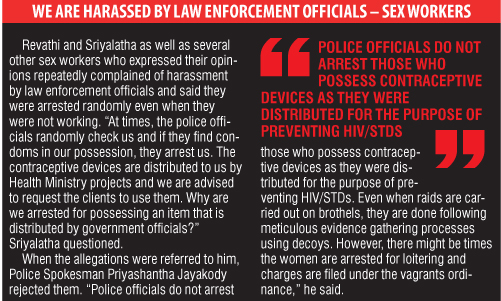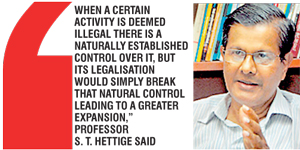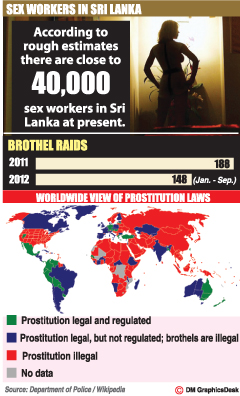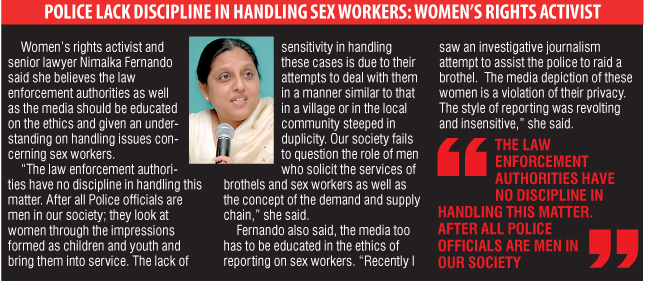Reply To:
Name - Reply Comment
Last Updated : 2024-04-24 11:56:00
(1).jpg) It’s just another late night in the streets of Colombo’s seedy underbelly. The narrow streets are occupied and vehicle movement has not seemed to recede in this part of town. Amidst the hustle and bustle, a white car swooshes past and makes an abrupt stop. A woman is pushed out and it drives away, disappearing into the darkness. Nobody rushes to her aid or bothers to stop the vehicle. She however appears unscathed as she gets off the street. Straightening her dress, she struts into a dark corner, fading into the shadows.
It’s just another late night in the streets of Colombo’s seedy underbelly. The narrow streets are occupied and vehicle movement has not seemed to recede in this part of town. Amidst the hustle and bustle, a white car swooshes past and makes an abrupt stop. A woman is pushed out and it drives away, disappearing into the darkness. Nobody rushes to her aid or bothers to stop the vehicle. She however appears unscathed as she gets off the street. Straightening her dress, she struts into a dark corner, fading into the shadows. Red tail lights of several vehicles gleam as they slow down near Revathi. She peeps in at a few but continues to ignore them as she walks along the pavement into another dark spot. “Once we leave these streets with a stranger, our safety is at stake. Street sex workers undergo the worst forms of violence and abuse. Speaking of my personal experiences alone, I have been drugged, assaulted and raped on several occasions. So now we have made a pact to inform another when we leave with a client.”
Red tail lights of several vehicles gleam as they slow down near Revathi. She peeps in at a few but continues to ignore them as she walks along the pavement into another dark spot. “Once we leave these streets with a stranger, our safety is at stake. Street sex workers undergo the worst forms of violence and abuse. Speaking of my personal experiences alone, I have been drugged, assaulted and raped on several occasions. So now we have made a pact to inform another when we leave with a client.” But she expresses her doubts on whether the legalisation would actually bring better working conditions for them. “People think it is only those who are uneducated and without options that enter this trade; they would be surprised to hear that some girls who work with me are university students. The Police don’t hesitate to arrest us but we don’t see them taking any action against foreign sex workers. If legalisation is ever implemented, I hope it doesn’t serve only the interests of the foreign women,” she says with a scornful smile.
But she expresses her doubts on whether the legalisation would actually bring better working conditions for them. “People think it is only those who are uneducated and without options that enter this trade; they would be surprised to hear that some girls who work with me are university students. The Police don’t hesitate to arrest us but we don’t see them taking any action against foreign sex workers. If legalisation is ever implemented, I hope it doesn’t serve only the interests of the foreign women,” she says with a scornful smile. The pro-legalisation lobby cites its effective impact towards curbing criminal involvement and the drug use, decreasing health risks particularly HIV and various sexually transmitted diseases (STDs), better working conditions for women engaged in the profession as well as the contribution it would make to the development of the tourism industry – a sector much highlighted by the present Government as making a significant contribution to the local economy.
The pro-legalisation lobby cites its effective impact towards curbing criminal involvement and the drug use, decreasing health risks particularly HIV and various sexually transmitted diseases (STDs), better working conditions for women engaged in the profession as well as the contribution it would make to the development of the tourism industry – a sector much highlighted by the present Government as making a significant contribution to the local economy. These findings are further supported by Colombo University Sociology Department Senior Lecturer, Professor S. T. Hettige’s statement, “Contrary to the popular belief that legalisation would help regulate, it would result in an expansion that would result in other social crises. It is a phenomenon similar to smoking. Where it is illegal to smoke, people would still engage in the activity in the private sphere. Where it is legal, it would be expanded to both private and the public spheres. When a certain activity is deemed illegal there is a naturally established control over it, but its legalisation would simply break that natural control leading to a greater expansion,” he said.
These findings are further supported by Colombo University Sociology Department Senior Lecturer, Professor S. T. Hettige’s statement, “Contrary to the popular belief that legalisation would help regulate, it would result in an expansion that would result in other social crises. It is a phenomenon similar to smoking. Where it is illegal to smoke, people would still engage in the activity in the private sphere. Where it is legal, it would be expanded to both private and the public spheres. When a certain activity is deemed illegal there is a naturally established control over it, but its legalisation would simply break that natural control leading to a greater expansion,” he said.conty Tuesday, 26 February 2013 11:00 PM
No matter how you lock at the issues, if there is a buck to be made there will always be crime & corruption taking place. If it is protection the women are given criminal gangs will pop up like mushroom which will never be controlled. The looser is always the sex worker. Unfortunately the if there is no employment available and the women are left behind by their partners having to feed and look after her brood leaves her no alternative but to engage in a trade that gives max benefits for the shortest period of work. If young & pretty 10- 2 can earn her up to Rs5000 no problem at all. In Canada when a sex worker is hired the minder takes a photo of the car she travels in if she is abused then the driver is hauled up & charges investigated. Then comes the payment for the minder he/she gets the bigger cut for the services. The vicious cycle starts again!!!!!!
Casanova Wednesday, 27 February 2013 01:01 AM
Sex Workers are just providing a evry necessary service. Not sure why everyone gets so worked up about this stuff, it's been going on for thousands of years and is simply another facet of mutually exploitative human behavior. Mostly voluntary.
Leave the sex workers alone , they are entrepreneurs who's providing a much needed service for all the hypocrites in what is effectively a warped and twisted society in this so called Dhamadeepe. Whats wrong with a Brothel? Much better than girls at risk walking the street.
Frederick Wednesday, 27 February 2013 05:30 AM
Legalising might add to the problem but the girls need help.I don't think anyone would willingly indulge in such activity, the majority do so for economic reasons.
So take steps to improve the lives of those girls who are involved, see if they can be retrained, but don't encourage it.
Raj Wednesday, 27 February 2013 07:37 AM
This should be legalized.

Add comment
Comments will be edited (grammar, spelling and slang) and authorized at the discretion of Daily Mirror online. The website also has the right not to publish selected comments.
Reply To:
Name - Reply Comment
US authorities are currently reviewing the manifest of every cargo aboard MV
On March 26, a couple arriving from Thailand was arrested with 88 live animal
According to villagers from Naula-Moragolla out of 105 families 80 can afford
Is the situation in Sri Lanka so grim that locals harbour hope that they coul